 Headline News
Headline News
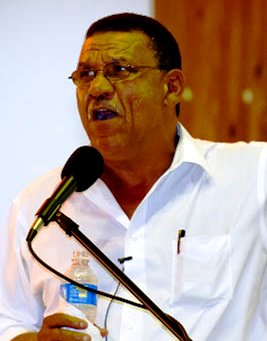
East Enders will fight dock
 (CNS): Over 150 people came out to a meeting regarding proposals to develop a commercial seaport in East End on Monday night and few, if any, were in support. The district’s elected representative Arden McLean told the people he was prepared to lead the opposition to the project from up front but the people would have to raise their voices and stand against it as the government had already revealed its support for the proposal. Prior to the public meeting demonstrating the considerable opposition in the community, the premier had said on Monday morning that few developments were ever supported by everyone and this one had the potential to bring in tremendous revenue. (Photo Dennie Warren Jr)
(CNS): Over 150 people came out to a meeting regarding proposals to develop a commercial seaport in East End on Monday night and few, if any, were in support. The district’s elected representative Arden McLean told the people he was prepared to lead the opposition to the project from up front but the people would have to raise their voices and stand against it as the government had already revealed its support for the proposal. Prior to the public meeting demonstrating the considerable opposition in the community, the premier had said on Monday morning that few developments were ever supported by everyone and this one had the potential to bring in tremendous revenue. (Photo Dennie Warren Jr)
At the meeting in his constituency McLean made it clear he opposed the development from a personal position but wanted to know how the people that elected him felt, and it was apparent from the response to his presentation that the audience agreed with his opposition. McLean revealed what he knew of the proposed development by Joe Imparato, with whom he had recently met.
McLean listed the various concerns from the belief that the canal to accommodate the ships would lead to contamination of the fresh water resources in the district by the eventual seepage of sea water into the underground lens, which would eventually deplete the area’s forests.
He spoke of the loss of several key dive sites in the area, as well as long term major environmental damage, the pollution, the quarrying on the fill (the main purpose of the development), the undermining of the local quarrying business, the dangers of the extensive flooding that would be caused in storms, the loss of the scenic road into East End, the cost of new roads which would have to be paid for by the public purse, and the probability that East Enders would be unlikely to derive any benefit.
McLean pointed out that during the first few years of the project as the developer excavated the fill from the area there would be no more than a handful of jobs, and that by the introduction of a specialist corporation to construct the port the developer would be able to by-pass the normal planning and other regulations.
"We have to stop this now," he said, warning that as a member of the minority opposition, if the proposal gets as far as the Legislative Assembly then he could not stop it. "I am here to lead you right up front and we need to send a message and we need to say it loud enough."
Answering McLean’s questions in the Legislative Assembly on Monday morning, McKeeva Bush made it clear that government was waiting to see the developer’s business plan, an economic impact assessment and an environmental impact assessment (which he is commissioning himself) but it believed the proposal had the potential to bring in “tremendous revenue”. Though he said at this stage the government knew no more about the details than what had been revealed in the public statement by Imparato recently. he said, “The developer has submitted a concept; that’s as far as it goes,” adding that it was one he believed in.
The premier did state, however, that he believed that a cargo port should not be in George Town. He said he had had always supported the notion of a commercial port in the North Sound, as he believed it was a natural harbour, but he could not get a proposal or the support for that. However he did support this idea for East end and, if it had started when he was in office the last time, it would be finished by now and be bringing in revenue.
He said he believed in the future financial viability of the project and there was money to be made in transshipment and the other proposals the developer had for the facility. Although others have doubted the viability of Cayman becoming involved in the shipping sector, Bush has said he believes it could be a source of money for the islands. He said he remained to be convinced that a commercial port couldn’t generate “tremendous revenue” for the country and had it already been constructed government would not have had to introduce all the recent fee increases.
Despite the opposition to the idea, he said that people generally come around to things once they have been finished and saw how good they were. The premier said that everyone had said that the Ritz-Carlton and Camana Bay were the worst things in the world when they were proposed. “I have never seen a project go that everyone supports,” Bush added. “They call you names and then ten years alter they say what a good thing it is.”
The premier accuse the member for East End of making opposition to the project but when everything was in hand he would go and talk to the people of East End about the proposal. He said the project had to be to the satisfaction of Cabinet before it would get support from government.
Bush confirmed that Imparato was currently drafting a proposal for special legislation that would create a similar development zone to that created for the London Docklands Development in the UK, ring fencing the facility from existing legislation regarding permits and zoning issues during its development phase. He said that government would be happy to pass the law if it was satisfied with the project once the assessments were confirmed.
The planned public meeting in North Side to be hosted by Ezzard Miller has been postponed until 7 December as a result of problems at the district civic centre.
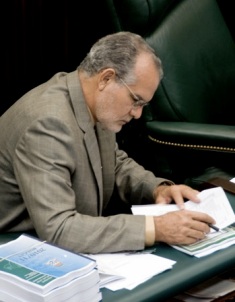
Review reveals $17M in cuts
 (CNS): The first phase of the government’s review of four public sector entities has identified potential savings of $17 million in spending and over $15 million has been approved by Cabinet. The deputy governor revealed that, following an assessment of the prison service, tourism, CINICO and public works — some of the highest spending agencies — the review team found savings in each of them equal to 21% of the total budget of $72 million currently allocated to the four entities. The review recommends some radical cuts in head counts and changes to services in all four departments.
(CNS): The first phase of the government’s review of four public sector entities has identified potential savings of $17 million in spending and over $15 million has been approved by Cabinet. The deputy governor revealed that, following an assessment of the prison service, tourism, CINICO and public works — some of the highest spending agencies — the review team found savings in each of them equal to 21% of the total budget of $72 million currently allocated to the four entities. The review recommends some radical cuts in head counts and changes to services in all four departments.
These cost savings will be realized over the next 12-36 months, Donovan Ebanks told the Legislative Assembly on Monday morning as he outlined the process of the review, which was initiated as a result of the agreement with the UK over the extension to the country’s borrowing parameters under the PMFL. The Cayman government is committed to realizing significant cuts over the next three years in order to eliminate the deficit and reduce borrowing.
Following the success of the first phase of the review, Ebanks said, government was now moving on to the second which will examine another eight agencies and hope to identify similar percentage savings. Ebanks said the results of the review sent a clear message regarding government’s commitment to reining in expenditure.
“To realize $15.2 million in savings from only four of government’s 62 public sector entities is a significant achievement," Ebanks said. "Those sceptics who condemned the approach and affixed to it labels such as ‘the fox guarding the hen house’ will not be as critical going forward when they realize that the approach has yielded accepted recommendations for 21%,” he stated.
Ebanks said the reviews had been conducted by teams of the brightest up and coming civil servants with assistance from the private sector. Ebanks said spending money commissioning an outside agency to conduct the review would have been rather ironic given the goal of the project is to cut government expenses. Now that such significant savings had been identified, he said, the service was committed to making the necessary changes.
“The public should know that Cabinet is fully committed to ensuring that these recommendations are implemented,” the deputy governor stated. “The Cabinet has appointed a monitoring mechanism to ensure that recommendations are not given lip service but instead are carried out as quickly and efficiently as possible and that it is kept regularly appraised of progress.”
He explained that the next phase, which will finish in December, will review the airports authority the port authority, children and family services, computer services, customs, education services, fire services and the RCIPS.
According to the report, which was laid on the table of the Legislative Assembly by the deputy governor making it a public document, the first phase has recommended some radical changes and cuts in order to realize the savings.
In the prison service the review has recommended closing the women’s prison at Fairbanks, have prisoners contribute to their own health care costs, sending high risk prisoners overseas, privatising prison escort and removing the prison officers’ housing allowances. Altogether more than $4 million dollars of cuts was identified in the service.
Meanwhile, in the Department of Tourism the review team recommended that it transfer a number of its jobs to other departments, such as scholarships to the Education Council, accommodation inspections to the Department of Environmental Health andthe analysis of tourism statistics to the Economics and Statistics Office, to allow it to concentrate on its core activity of promoting the Cayman Islands. It also recommends that the DoT stop sponsoring events such as the Jazz Fest. The review identified a $3.5 million of possible savings for the department.
Cost cutting at public works will be down to head count reductions and by privatisation of many of the services it currently provides, amounting to over $2.2 million in savings. However, the review team warned that with the current unemployment levels, care needed to be taking when reducing jobs that government did not shift salary costs to social costs.
At CINICO, the government’s health insurance company, the review team recommended that government reconsider the health benefits given to future civil servants, review of existing policies and that the body needed a redesign of its business strategy and claimed it could realize as much as $7.2million.

Cruise port not settled
 (CNS): The premier told the Legislative Assembly Monday that government, the port authority and the developer DECCO are all still negotiating the details of the proposed development of cruise berthing facilities in George Town. While answering a number of questions from the opposition member for East End, McKeeva Bush said that such negotiations were always difficult, especially as the public were saying one thing, the developer wanting another thing and the government something else. The premier said the current negotiations were focused on the length of the lease the developer would get on the land which would be reclaimed as part of the project.
(CNS): The premier told the Legislative Assembly Monday that government, the port authority and the developer DECCO are all still negotiating the details of the proposed development of cruise berthing facilities in George Town. While answering a number of questions from the opposition member for East End, McKeeva Bush said that such negotiations were always difficult, especially as the public were saying one thing, the developer wanting another thing and the government something else. The premier said the current negotiations were focused on the length of the lease the developer would get on the land which would be reclaimed as part of the project.
Bush said under the agreement signed in September, the lease could be up to 99 years but how long it would actually be was the issue in question. “The range which is provided for in the framework agreement is a long term lease and the definition of long term is between 21 and 99 years. The reason for that range is because until all the revenue, cost and risk analysis has been completed it is not possible to determine the period of time necessary for the financial viability of the project.”
The premier stated that the negotiations were highly sensitive and still ongoing. “Obviously the developer will want as long a lease as possible and the government is working to get as short a lease as possible.”
He said the period of the framework agreement between the public authorities and Dart’s general contracting company was for four months with room for a two month extension if needed and Bush said he was hoping some agreement would be arrived at before the end of this year. He confirmed that the developer has estimated the project will take between 18-24 months to complete once work is underway.
Asked by Arden McLean if there had been any concerns raised by the Foreign and Commonwealth Office in the UK, about any aspects of the project, the premier said he was not aware of any and if the member knew anything about that he should let him know.
The government is hoping that it can come to a favourable agreement where DECCO finances and constructs two finger piers in George Town and the associated upland facilities. The developer will recoup his investment partially through fees from the cruise lines and partially through the revenue earned from the potential landside facilities ona long term lease. Once that lease is up the facilities will revert into the hands of government.
The development of the facilities will include reclamation of land for both the piers and the upland element of the project and will also require redevelopment of the downtown George Town area. There have been concerns in a number of quarters that the development could impact the quality of Seven Mile Beach and may have a detrimental impact on Cayman’s overnight tourism product.
However, according to government Cayman must develop these facilities in order to hang on to its share of the cruise business. The need for cruise berthing facilities it says has been further compounded by the arrival of a new class of mega cruise ships that the cruise lines have sated will not call at ports without berthing facilities.
With no money to fund the development of piers the government sought proposals from the private sector and selected DECCO (part of the Dart Group, the developers of Camana Bay) because as well as being able to design an construct the facility the company was also in a position to finance the project.
Government signed an MOU with Dart in April and then a framework agreement in September. Although it was announced that an environmental Impact Assessment would be started after the MOU was signed so far it has not been confirmed if the report has been completed or when it will be made public.
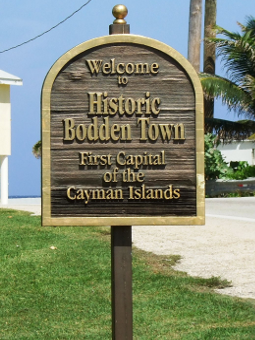
No elections for new councils
 (CNS): The district councils which have been outlined in the Cayman Islands Constitution will not be elected bodies but the members will be selected by Cabinet. According to the law, which will come before legislatures during this current sitting, the new local political bodies designed to advise the relevant elected members of the Legislative Assembly for the districts will all be appointed by government. Of the maximum of ten councillors only two have to be recommended by the opposition in each district, unless there is no government member in the constituency when Cabinet will only be able to appoint three members. (Photo by Lisa Butcher)
(CNS): The district councils which have been outlined in the Cayman Islands Constitution will not be elected bodies but the members will be selected by Cabinet. According to the law, which will come before legislatures during this current sitting, the new local political bodies designed to advise the relevant elected members of the Legislative Assembly for the districts will all be appointed by government. Of the maximum of ten councillors only two have to be recommended by the opposition in each district, unless there is no government member in the constituency when Cabinet will only be able to appoint three members. (Photo by Lisa Butcher)
The members will have to live in the district and, according to the proposed legislation, will have “special qualifications, training, experience or knowledge of the district” suitable to the role.
There is no provision in the law for the new district councillors to be elected by the people of the district. So far, the only district in which such an advisory body already exists is North Side, where the independent member, Ezzard Miller, held public ballots at district meetings to elect the council. So far that body has undertaken a number of projects, including raising the money to install a network of close circuit television cameras to help fight crime in the community.
Miller meets regularly with his council to discuss the motions and questions he intends to bring to parliament, as well as what position he should take on government legislation and policies on behalf of the people of the district.
Under the proposed law, which will introduce councils in all six electoral districts, the members will be appointed for one year but can be reappointed after that, and the terms and conditions of service will be determined by the government.
The main role of the members will be to advise their MLAs on the major issues with regards to the district’s needs and to help their elected representatives discharge their duties towards their constituents more efficiently and effectively. The MLAs will then take the advice of their councils to the relevant ministers when necessary.
The district councils will receive some funding through the budgetbut they will also be able to raise their own cash for specific projects. The councils will be expected to meet a minimum of four times per year in public, though the chair will have the power to call for in camera sessions.
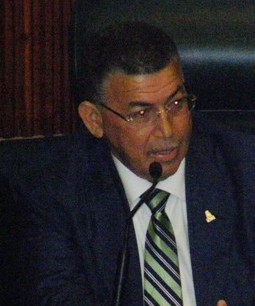
Mac hints at stimulus
 (CNS): The country’s premier has offered some future hope for the construction industry in the coming months as he says he will be introducing a range of incentives, which include reducing and deferring planning fees and rebates on work permit fees for senior staff. McKeeva Bush said that he will be announcing full details of what will amount to a stimulus package for development in the next week or so but hinted in the Legislative Assembly on Friday afternoon that the government was discussing some incentive proposals for developments starting in the first half of 2011. He said the construction industry was of particular importance to the local economy and he wanted to kick start projects.
(CNS): The country’s premier has offered some future hope for the construction industry in the coming months as he says he will be introducing a range of incentives, which include reducing and deferring planning fees and rebates on work permit fees for senior staff. McKeeva Bush said that he will be announcing full details of what will amount to a stimulus package for development in the next week or so but hinted in the Legislative Assembly on Friday afternoon that the government was discussing some incentive proposals for developments starting in the first half of 2011. He said the construction industry was of particular importance to the local economy and he wanted to kick start projects.
The premier suggested that he was considering one off reductions for new or renewed work permits for senior and specialist technical staff, such as architects and engineers, in the construction industry working on projects that would be underway and employing Caymanians before June 2011.
He said a stimulus package for the construction sector would be like a stimulus package to the whole economy as once projects were underway they would fuel consumption, not just for the developments but those jobs created by the projects would see the employees spending in the local economy. He said duty waivers would also be available for certain goods and materials relating to new developments.
Bush said he was limited in what he could do because of the commitment he had made to the UK for the three year budget plan, but he said the construction industry was an important place to start to offer a stimulus package and he was going to impress upon the UK the need to give the sector assistance. The premier said once the analysis and research was complete, he could be more precise about what size reductions the government could give on the various fees and duties associated with the business of developing.
“We need to jump start our economy now,” he told the Legislative Assembly, and said there was reason to be cautiously optimistic that things were improving. “It is going to start to get better and we are going to pull ourselves out.” Bush warned that government had to be careful, however when it started there would be jobs again for Caymanians.
The premier raised the issue of the stimulus package in what was a heated debate regarding a private member’s motion on duty waivers brought by the independent member for North Side. Ezzard Miller had asked government to make it a requirement that duty waivers could only given on goods bought at local merchants to ensure the locally economy benefitted. However, government proposed an alternative motion which suggested instead that where waivers were given government would give a higher percent to good’s bought on island.
The debate is set to continue on Monday when the Legislative Assembly meets again.
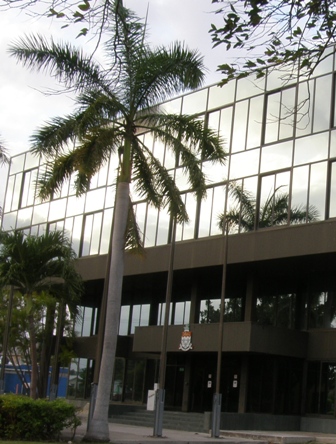
Deficit change down to cuts
 (CNS): Although government revenue did not increase significantly in the last financial year, reductions in operating expenses of around $17 million have resulted in smaller deficit for than government had predicted earlier this year. While the UDP administration had originally called for a $5 million surplus when it brought its first full budget, as the financial year drew to a close it revised those expectations and predicted a deficit of as much as $45 million. Unaudited figures now reveal, however, that as a result of spending cuts the actual deficit is going to be closer to $15 million. In the Legislative Assembly on Friday the premier said the results were taken from management accounts prepared by the Treasury.
(CNS): Although government revenue did not increase significantly in the last financial year, reductions in operating expenses of around $17 million have resulted in smaller deficit for than government had predicted earlier this year. While the UDP administration had originally called for a $5 million surplus when it brought its first full budget, as the financial year drew to a close it revised those expectations and predicted a deficit of as much as $45 million. Unaudited figures now reveal, however, that as a result of spending cuts the actual deficit is going to be closer to $15 million. In the Legislative Assembly on Friday the premier said the results were taken from management accounts prepared by the Treasury.
“The financial results and positions reflect what ministries and portfolios have posted in their general ledgers for the years ended 30 June 2010 and 30 June 2009,” McKeeva Bush told his legislative colleagues following some speculation regarding the results. He said confirmation and discussions had been held with the various ministries and government companies and the results were both meaningful and robust.
Although the accounts have not been audited by the auditor general yet, Bush said the figures form the basis for the preparation of core government results that will be included in the consolidated entire public sector financial statements that are audited by the Auditor General’s Office.
The premier said although there would be expected changes during the process of auditing, he said government found it “desirable" to release the preliminary figures.
Setting out the latest figures, he did not outline where the cuts had been made but noted that the revised budget had anticipated that government would spend $502 million in this financial year but these figure suggest government actually spent around $485 million. He also said that the anticipated losses by statutory authorities and government companies of around $2.5 million turned out to be around $1.5 million.
Government revenue had been predicted to be $562 million when it brought its 2009/10 budget but it revised that forecast down to $492 million, so the revelation that government earned some $502 million in the last financial year means government earned $10 million more than anticipated.
According to a written answer given to the opposition this week following a question submitted in the previous sitting of the House that was never answered in the chamber, most of government’s revenue earning routes took in less than anticipated. Earnings from duty, for example, reached only 85% of the expected revenue, while the mutual fund and securities sector both exceeded expected earnings.
Although it was not clear where exactly the cuts were made, Bush said this year’s personnel bill for civil servants in core government amounted to $228 million or 47% of the operating costs. In the original budget government had expected to spend $244 million on pay and benefits so had made savings of some $16 million even before the 3.2% rollback was introduced in July of this year.

Hospital plans forge ahead
 (CNS): The health minister has denied any change regarding the government’s commitment to the proposed hospital developmentby Dr Devi Shetty. Mark Scotland said that the legislative changes required to the health practitioners and tort laws, part of the deal with the India doctor, would be brought to the Legislative Assembly in the next sitting and the organ donor law would follow soon after. He also said that Shetty and his local partners had identified a short list of possible locations and were examining them for suitability. Responding to a series of opposition questions in the LA on Friday morning, Scotland said he was meeting regularly with Shetty’s team and they had expressed no frustrations.
(CNS): The health minister has denied any change regarding the government’s commitment to the proposed hospital developmentby Dr Devi Shetty. Mark Scotland said that the legislative changes required to the health practitioners and tort laws, part of the deal with the India doctor, would be brought to the Legislative Assembly in the next sitting and the organ donor law would follow soon after. He also said that Shetty and his local partners had identified a short list of possible locations and were examining them for suitability. Responding to a series of opposition questions in the LA on Friday morning, Scotland said he was meeting regularly with Shetty’s team and they had expressed no frustrations.
The minister explained that in its agreement with Shetty, the internationally acclaimed surgeon, to develop a health city in the Cayman Islands, the government had agreed to make certain legislative changes. This included changes to the law to enable doctors with qualifications from India to be able to practice here, creating an exclusivity period for Shetty’s hospital on medical tourism and a cap on damages claims regarding medical malpractice suits, as well as a new law to permit tissue and organ donation.
Scotland said the government was committed to the tort reform, not just because of the Shetty hospital but because of the problems it was causing for other local medical practitioners, such as Ob/Gyns, despite the Law Reform Commission’s recommendations against it. Scotland said the LRC was still in a period of consultation and was seeking input and had not concluded anything yet.
The minister added that government was fully committed to the venture and was moving forward on all the necessary work required to make it a reality.
Aside from having shortlisted the potential locations for his health city, Shetty’s team was preparing the designs for the first phase of the project, which would be a 150 bed tertiary care hospital, Scotland revealed.
“I can say with confidence, based on my discussions with Dr Shetty and his local team that he still remains fully committed to proceeding with all the phases of the project, including an integrated hospital and medical university and assisted-living facility,’ he said. “Government remains fully committed to this project, which we see as an important and integral component in not only creating a medical tourism industry in the Cayman Islands but also increasing local access to tertiary care.”
Scotland dismissed any allegations that there were problems on either the government or the developer’s side and that government was hard at work meeting its commitments under the deal.
Shetty will be in the Cayman Islands this week and will be answering questions at a special Chamber meeting on Wednesday afternoon before delivering a presentation at the country’s first ever national health conference, which opens on Thursday evening.

Teenager arrested after cops find ammunition
 (CNS): Police said yesterday that they had arrested a sixteen year old boy on Thursday for on suspicion of possession of an unlicensed firearm. The RCIPS said the teenagers arrest came after a police operation that took place at about 9.20am on Thursday 4 November in the George Town area. The operation was to have been in the vicinity of the Family Life Centre which is in the heart of the capital’s schools district. Police said that a quantity of ammunition was recovered but gave no other details. The juvenile who was arrested as a result of the operation remains in police custody while enquiries are ongoing, a police spokesperson stated. (Photo Dennie WarrenJr)
(CNS): Police said yesterday that they had arrested a sixteen year old boy on Thursday for on suspicion of possession of an unlicensed firearm. The RCIPS said the teenagers arrest came after a police operation that took place at about 9.20am on Thursday 4 November in the George Town area. The operation was to have been in the vicinity of the Family Life Centre which is in the heart of the capital’s schools district. Police said that a quantity of ammunition was recovered but gave no other details. The juvenile who was arrested as a result of the operation remains in police custody while enquiries are ongoing, a police spokesperson stated. (Photo Dennie WarrenJr)
If you have any information about gun crime, or the whereabouts of illegal firearm contact your local police station or the confidential Crime Stoppers number 800-8477 (TIPS)

Bodden not guilty over guns hidden in toy
 (CNS): A jury of five women and two men took less than two hours to find Cassandra Bodden not guilty of the importation of firearms on Friday afternoon following a mistrial earlier this year. Bodden was finally acquitted over four guns and more than 420 bullets found in a toy car which was shipped to her from the United States. The prosecution had claimed that Bodden knew the weapons were hidden in the package, while 26-year-old Bodden had always protested her innocence, saying she did not know and had made it abundantly clear she did not know. (Photo Dennie Warren Jr)
(CNS): A jury of five women and two men took less than two hours to find Cassandra Bodden not guilty of the importation of firearms on Friday afternoon following a mistrial earlier this year. Bodden was finally acquitted over four guns and more than 420 bullets found in a toy car which was shipped to her from the United States. The prosecution had claimed that Bodden knew the weapons were hidden in the package, while 26-year-old Bodden had always protested her innocence, saying she did not know and had made it abundantly clear she did not know. (Photo Dennie Warren Jr)
For the second time a jury heard the crown’s case against Bodden regarding the incident which took place in April 2009. Tirsha Hutchinson for the prosecution claimed that Bodden had deliberately contacted a number of police officers with whom she was friends to ask about the package to cover her tracks as she knew the guns were hidden inside the toy car. In her defence however, Ben Toner had argued her case that she was not aware of what was in the package and her reasons for contacting them was because she was unsure about collecting a package when she was not expecting one.
When she realised it was from someone she knew when she saw the handwriting on the documents she decided it may be a joke from a friend and so made plans to collect it. The fact that she had notified the authorities that she was not expecting it was the reason why it was examined and the guns discovered. Toner had argued in both the first and second trial that she had assisted the authorities in preventing these weapons from making it on to the streets but instead of being commended she was being charged with a crime she did not commit.
When the judge sent the jury out at lunchtime on Friday after he summed up the case the seven members returned a few minutes later with one question – Why had Bodden not taken the advise of her police friends to not collect the package? The judge told the jury that was something they have to decide for themselves. Less than two hours later they returned with the not guilty verdict and acquitted the twenty six year old women.
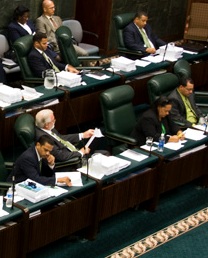
Gov’t says ‘no’ to WP fee cuts
 (CNS): The government offered no response to a private member’s motion asking it to reduce the work permit fee increases imposed in the last budget and voted the motion down. Opposition member for George Town, Alden McLaughlin, brought the motion, which was seconded by the member for North Side, on Thursday. Suggesting that as the fee increases were having the reverse effect intended by government, McLaughlin asked for a cut to help small businesses. Although the premier has spoken on a number of occasions recently about possibly reducing the work permit fees for small business with five employees or less, no one from the government benches spoke on the subject and all of them voted ‘no’ to the suggestion. (Photo Dennie WarrenJr)
(CNS): The government offered no response to a private member’s motion asking it to reduce the work permit fee increases imposed in the last budget and voted the motion down. Opposition member for George Town, Alden McLaughlin, brought the motion, which was seconded by the member for North Side, on Thursday. Suggesting that as the fee increases were having the reverse effect intended by government, McLaughlin asked for a cut to help small businesses. Although the premier has spoken on a number of occasions recently about possibly reducing the work permit fees for small business with five employees or less, no one from the government benches spoke on the subject and all of them voted ‘no’ to the suggestion. (Photo Dennie WarrenJr)
The motion asked for the fees on all work-permits to be cut back to the levels before the increases were imposed, and although it was unlikely that government was ever going to accept it in its entirety, the motion presented an opportunity for government to reveal what plans, if any, it had for cutting fees over and above the key employee fee. However, neither the premier nor any of his ministers present or even the backbenchers chose to speak on the issue.
The chair of Cayman Finance, Anthony Travers, said at the recent Generation Now forum on taxation that his organisation was recommending that government cut the work permit costs as soon as possible as they were only ever intended to be temporary until government managed to cut operating expenses. However, all of the members present in the Legislative Assembly on the government benches remained silent when the debate opened and said nothing at all on the subject.
Despite pleas made by McLaughlin, who pointed out that some fees had tripled and were crippling local businesses, the government remained silent.
The George Town member also pointed to the contradiction of the high fees with government’s much heralded position of welcoming overseas investors or rolling out the “green carpet”, as the premier often referred to it, but to no avail. “On the one hand government speaks passionately about stopping the haemorrhaging of businesses but on the other this policy significantly increases the cost of doing business,” McLaughlin said.
With work permit numbers down from a high of over 26,500 in December 2008 to less than 21,000 last month, McLaughlin said the increase in fees had not improved government revenue as people were simply not taking out permits. He acknowledged that the fees were not the only cause of the significant fall in numbers and like most of Cayman’s economic decline it was due to the worst global recession in 70 years, but by increasing the cost of a key element of doing business government had not helped, the PPM member observed.
He said that with the reduction in key employee fees and the news that operating costs were down and the deficit less than anticipated, government had room to reduce the fees. If government were to reduce the fees, the revenue intake might grow as it would stimulate the local economy again because the fees were simply too high at present to encourage business to take on staff, the member implied.
“With so many businesses just struggling to keep going never mind turn a profit,” the former Cabinet minister said, government had to look at the issue. He said that the opposition had warned when the fees were implemented that they were likely to have the reverse effect, which is what had happened.
With the exception of an objection from Premier McKeeva Bush, who accused the opposition member of straying from the subject of his motion when he spoke about the budget, the government benches stayed silent on the issue until the motion was put to the vote, when it was emphatically rejected.
The Legislative Assembly will resume on Friday morning with parliamentary questions followed by a private member’s motion from the North Side representative asking government to require developers receiving duty concessions to buy local.